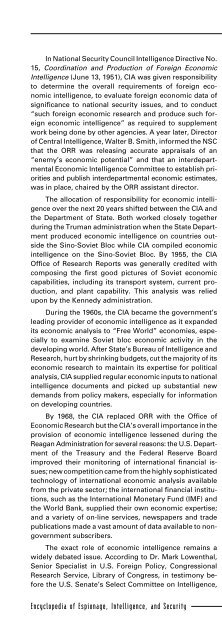ENCYCLOPEDIA OF Espionage, Intelligence, and Security Volume ...
ENCYCLOPEDIA OF Espionage, Intelligence, and Security Volume ...
ENCYCLOPEDIA OF Espionage, Intelligence, and Security Volume ...
Create successful ePaper yourself
Turn your PDF publications into a flip-book with our unique Google optimized e-Paper software.
Economic <strong>Intelligence</strong>In National <strong>Security</strong> Council <strong>Intelligence</strong> Directive No.15, Coordination <strong>and</strong> Production of Foreign Economic<strong>Intelligence</strong> (June 13, 1951), CIA was given responsibilityto determine the overall requirements of foreign economicintelligence, to evaluate foreign economic data ofsignificance to national security issues, <strong>and</strong> to conduct“such foreign economic research <strong>and</strong> produce such foreigneconomic intelligence” as required to supplementwork being done by other agencies. A year later, Directorof Central <strong>Intelligence</strong>, Walter B. Smith, informed the NSCthat the ORR was releasing accurate appraisals of an“enemy’s economic potential” <strong>and</strong> that an interdepartmentalEconomic <strong>Intelligence</strong> Committee to establish priorities<strong>and</strong> publish interdepartmental economic estimates,was in place, chaired by the ORR assistant director.The allocation of responsibility for economic intelligenceover the next 20 years shifted between the CIA <strong>and</strong>the Department of State. Both worked closely togetherduring the Truman administration when the State Departmentproduced economic intelligence on countries outsidethe Sino-Soviet Bloc while CIA compiled economicintelligence on the Sino-Soviet Bloc. By 1955, the CIAOffice of Research Reports was generally credited withcomposing the first good pictures of Soviet economiccapabilities, including its transport system, current production,<strong>and</strong> plant capability. This analysis was reliedupon by the Kennedy administration.During the 1960s, the CIA became the government’sleading provider of economic intelligence as it exp<strong>and</strong>edits economic analysis to “Free World” economies, especiallyto examine Soviet bloc economic activity in thedeveloping world. After State’s Bureau of <strong>Intelligence</strong> <strong>and</strong>Research, hurt by shrinking budgets, cut the majority of itseconomic research to maintain its expertise for politicalanalysis, CIA supplied regular economic inputs to nationalintelligence documents <strong>and</strong> picked up substantial newdem<strong>and</strong>s from policy makers, especially for informationon developing countries.By 1968, the CIA replaced ORR with the Office ofEconomic Research but the CIA’s overall importance in theprovision of economic intelligence lessened during theReagan Administration for several reasons: the U.S. Departmentof the Treasury <strong>and</strong> the Federal Reserve Boardimproved their monitoring of international financial issues;new competition came from the highly sophisticatedtechnology of international economic analysis availablefrom the private sector; the international financial institutions,such as the International Monetary Fund (IMF) <strong>and</strong>the World Bank, supplied their own economic expertise;<strong>and</strong> a variety of on-line services, newspapers <strong>and</strong> tradepublications made a vast amount of data available to nongovernmentsubscribers.The exact role of economic intelligence remains awidely debated issue. According to Dr. Mark Lowenthal,Senior Specialist in U.S. Foreign Policy, CongressionalResearch Service, Library of Congress, in testimony beforethe U.S. Senate’s Select Committee on <strong>Intelligence</strong>,Encyclopedia of <strong>Espionage</strong>, <strong>Intelligence</strong>, <strong>and</strong> <strong>Security</strong>August 5, 1993, no one questions the importance of economicissues but there is “no broad consensus” about the<strong>Intelligence</strong> Community’s proper role in it. He noted thatthe issue has been oversimplified by calls for “moreeconomic intelligence” unsupported by any “knowledgeof long st<strong>and</strong>ing activities in that area or of the likely utilityof these intelligence activities <strong>and</strong> products to economicproblems or issues.” Lowenthal argues that no persuasivecase has yet been made that “U.S. economic competitivenessrequires large-scale aid from the <strong>Intelligence</strong>Community.”Types of information. There are three main sources ofeconomic intelligence. The first, open sources, range fromofficial statistical publications, newspapers, radio broadcasts,<strong>and</strong> trade publications to IMF country studies.Unclassified sources generally constitute the foundationof any economic analysis, an interpretation of the overallpicture.The second are the reports <strong>and</strong> cables from U.S.embassies <strong>and</strong> consulates, compiled by State Departmenteconomic officers, Treasury Department attachés, <strong>and</strong>officers of the Foreign Commercial Service.The third, cl<strong>and</strong>estine information, is obtained withouteither the knowledge or consent of foreign governments.It can come from satellites, from intercepted communications,or from secrets stolen by a foreign nationalemployed by the United States.Present situation. The CIA, assisted by other governmentagencies, provides economic intelligence for U.S.policy, with experts monitoring international transactions(including sanctions enforcement <strong>and</strong> illicit finance);international economic <strong>and</strong> environmental problems, includingtrade <strong>and</strong> finance; defense markets <strong>and</strong> logistics;geographic resources, including demographics <strong>and</strong> commodities;civil technology, including aerospace, advancedmanufacturing, <strong>and</strong> emerging technologies; <strong>and</strong> energyresources. However, critics feel that American companiesdon’t need the CIA to compete in the global marketplace.The glut of information (sometimes too much information)coming from the Internet, private citizens, groups<strong>and</strong> organizations with access to foreign economic activities,<strong>and</strong> subscriber services, such as The Economist’sEconomic <strong>Intelligence</strong> Unit (EIU) databases, complement<strong>and</strong> sometimes replace official channels.Resources. The official record of economic intelligence inU.S. economic diplomacy is in the Foreign Relations of theUnited States series volumes compiled by the Office of theHistorian, U.S. Department of State; published by theGovernment Printing Office. Beginning with 1944: vol. II;General: Economic <strong>and</strong> Social Matters (Washington: GPO,1967), individual volumes have dealt with U.S. economicpolicy.375







![The Big Lie 9-11 and Government Complicity in Mass Murder [PDF]](https://img.yumpu.com/50957077/1/190x245/the-big-lie-9-11-and-government-complicity-in-mass-murder-pdf.jpg?quality=85)








